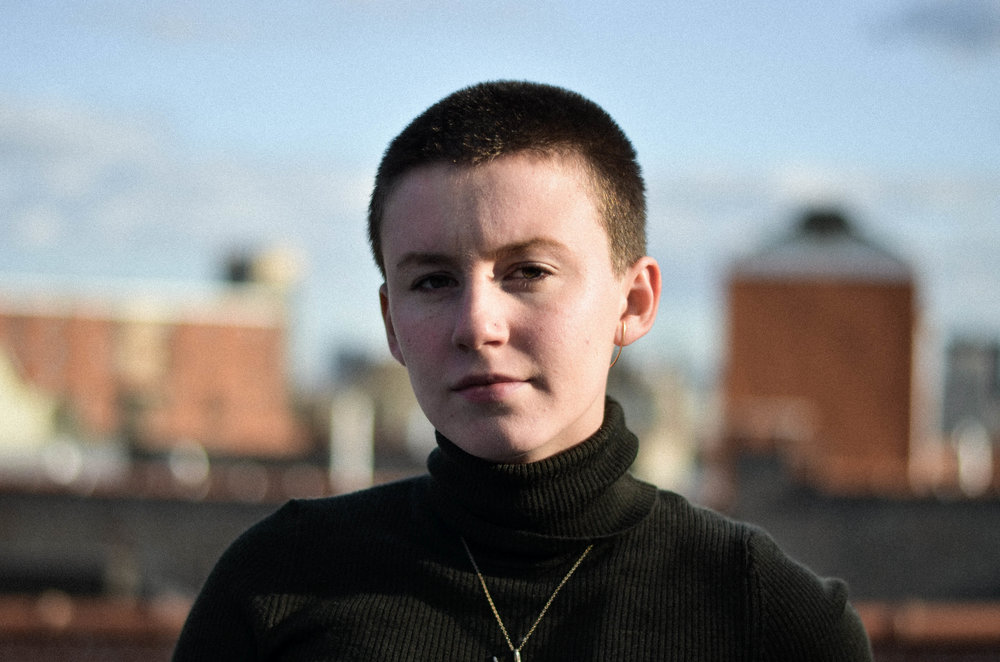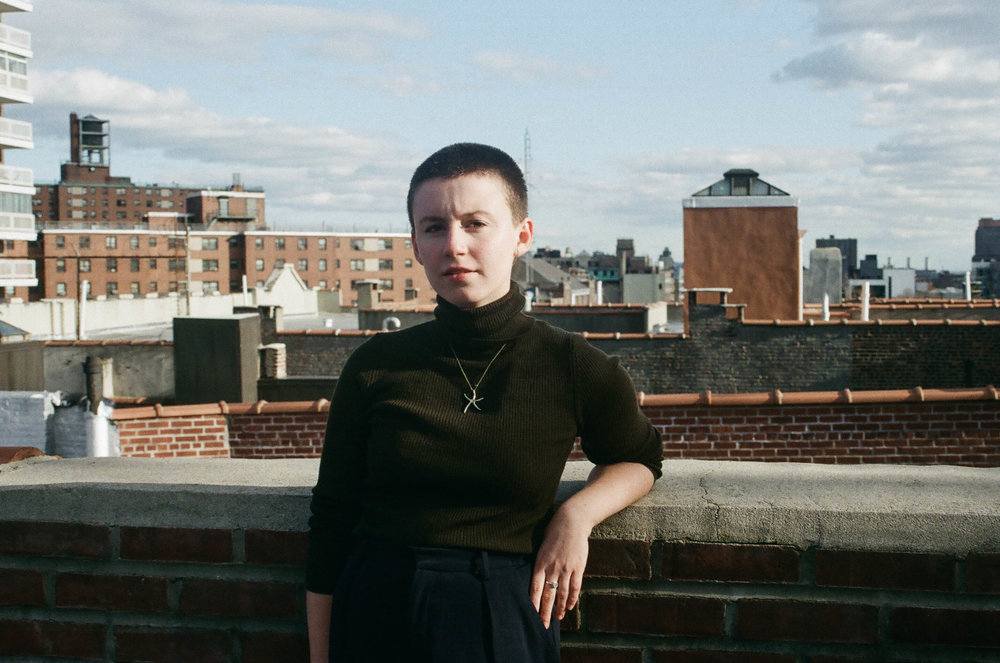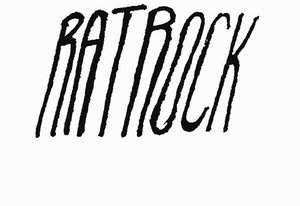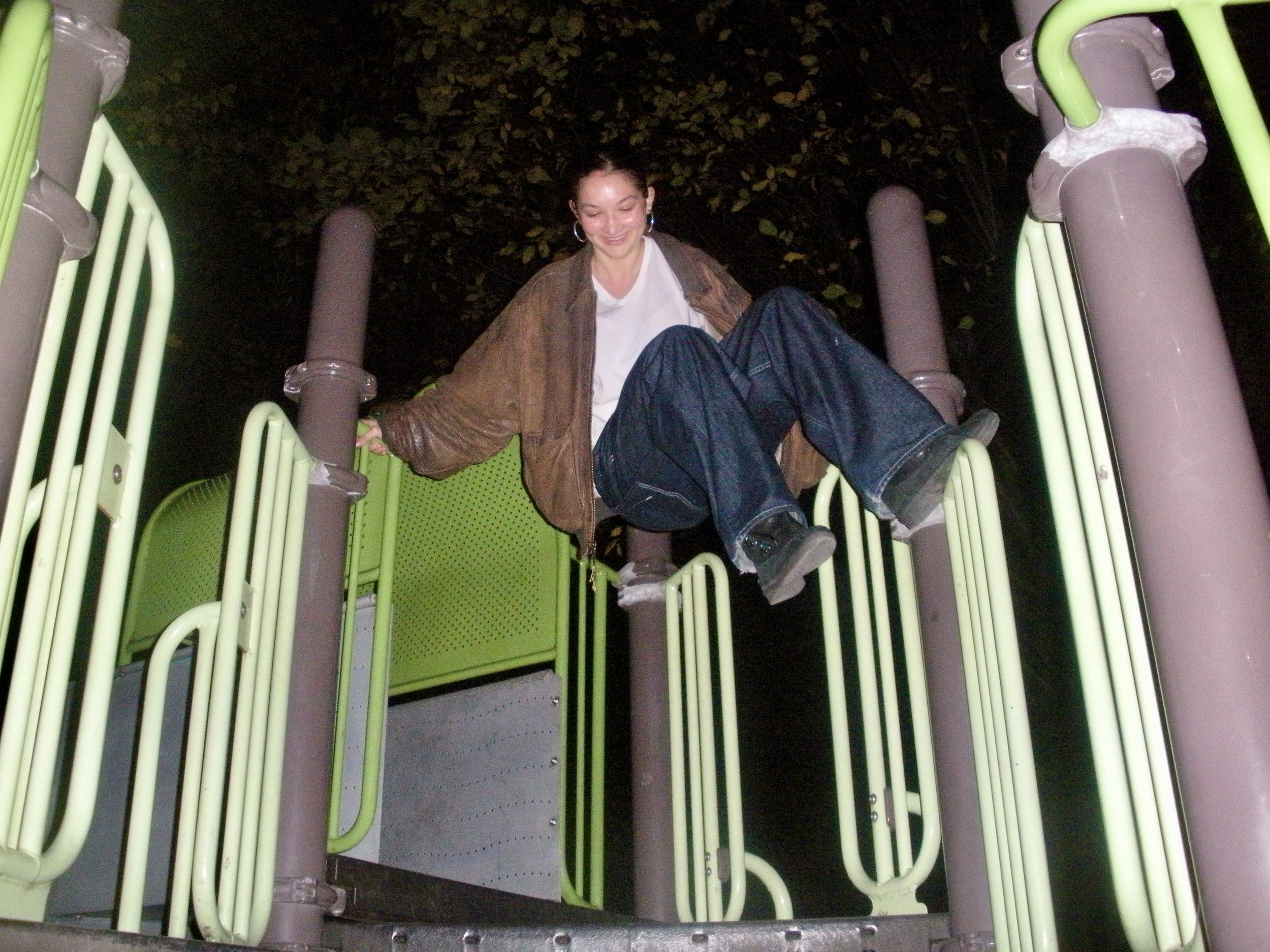





Photography by Clara Hirsch
Interviewed by Matt Munsil
If you had to use 3 words or so to describe your poetry, which would you use?
I guess water, memory, and opaque.
When you say “water” in regards to your poetry, what does that mean?
I just mean that I’m obsessed with water in my writing. That wasn’t supposed to describe the quality of my writing, that’s just the center of a lot of my writing, which just happened this summer because I was living in New York, and I went all the way out to the beach sometimes. I realized that being in water is my favorite thing, so I go swimming pretty frequently at Dodge in the pool and I found that swimming is a lot like writing in a lot of ways, so I think of swimming and water as a main-- not just subject, but technique in my writing.
How do you approach producing poetry? Your poetry seems to take on different voices, sometimes it’s more stream-of-consciousness, sometimes it’s more calculated, is there a general approach you have, or does inspiration just strike?
I think I tend to write down a lot of notes in my journal, and a lot of my notes are just long paragraphs of items I put together to see how they work, and some of my poems are just direct transcriptions of those. And then others are based on things I’ve read or I’ve studied in school. One of the poems I wrote when I was writing a paper about Emma Goldman [note]. And I think it depends [on the poem]. This is hard because I’ve been writing more fiction this semester but I think the approach is the same. But I think that a lot of my poems have been things that I’ve wanted to turn into stories, so I think I approach them from that perspective.
You mentioned the notes you would take in your journals, and some of the works of yours on Ratrock are just literally scans of notebooks, so at what point do you say, this is a work of poetry which I want to share with someone? What is the difference for you between when you type out a poem and submit that as a finished product versus when you submit scans of notebooks?
I think when I look back at poems, even those that are typed, I never really feel satisfied with them, so often I like to just preserve a poem in its original form because no matter what I know I’ll want to come back to it and change it, so I like just having it be what it first is before I can change it at all, if that makes sense. I’d rather it be completely out there without any changes rather than like-- the process of revising any piece of writing is infinite, so I feel like I need to capture what it first is in order to come back to it later.
For you, what is the purpose of your poetry? Do you see it as self-expression, self-exploration, societal exploration? Or is it just whatever strikes you?
I think writing is just a way to keep myself happy. I like when other people read it and I’m happy it was published, but I don’t-- I think a lot of-- I’ve always written because it’s a way to regulate -- so the poet Anne Carson, she has this quote, I forget which book it is, where she talks about her mom. But she talks about writing as like-- everyone is always carrying things around and you need to find a way to put them down, and that’s sort of what writing is for me, because I’m very neurotic so it helps to break the cycle of that by just putting stuff down on paper. I think in my fiction which I’m working on now I’m trying to do more journalistic-type writing to capture people and places without involving myself as much.
It seems like you go into deep emotional spaces and also intellectual questions in your poetry, do you find that process cathartic, usually?
Yeah. I think-- definitely. I think that emotional and intellectual questions are often really intertwined for me. And thinking about intellectual questions allows me to think about - being intellectually stimulated is a big part of my emotional life, and vice versa.
Two of your handwritten poems actually display artwork alongside the actual text. Do you like to play poetry and the visual arts off of each other, or is that incidental?
Yeah. I mean I have to say I sort of submitted a bunch of random stuff, because Caroline (Ratrock Editor) talked about contributing stuff that showed my process of writing, so I thought sending in scans from my journals would be good. I think visuals are very good for me, I was thinking about a volcano after another Anne Carson book. And then the other drawings were from this-- I found this thing online which was an interactive, very blown-up painting of the Hieronymus Bosch painting (The Garden of Earthly Delights). And I do a lot of this while I’m at work, I work at the music library at Dodge, and a lot of the time I’m just sitting there and I don’t like to have my phone or computer out so I like to just draw things or copy things down. So a lot of it is just filling my free time, but it usually turns into something.
You mentioned that Caroline asked for a sketch of your process or work that demonstrates that process. When you submit something that’s handwritten or from a journal where it might seem less complete or finished to a typical reader, is that a self-conscious thing? Do you want to change the way people perceive the poetry?
I mean I think I’ve always really been drawn to people who keep personal notebooks and like, I love to share my journal with people and I love when people share their personal notebooks or journals with me, and I really like the idea of that being its own art form. I’ve always been really interested in that. I guess you could look at it as incomplete, but as I said before, because you’re not working on a computer and there are traces of everything you do, it’s a lot more honest.
Segueing based on the idea of completeness. You’ve mentioned that you think of writing as a continual process of revision. Have you ever felt like you’ve reached a point where a poem of yours is complete, or is it just impossible to have a complete poem? Or are you always trying to improve it?
I think there are some things I do with poems to try to complete them. When I’m very specific about meter or line length, or set rules for a poem, then when I fit a poem into those rules then that helps me complete it. But I don’t know. But the summer after my freshman year I made this zine with a bunch of complete poems and I think of that as a finished product, but when I look back at it I think that they’re all really bad. So I guess yes is the answer.
Other than Anne Carson, are there other poets or artists who have influenced your work significantly, and in what ways?
The singer Joanna Newsom is one of my biggest inspirations. I listened to her a lot over the summer when I was near the beach, and that was really great. She plays the harp and her lyrics are just incredible, and voice adds so much to everything she does. I’m taking an interesting class right now called Early Ecopoetics where we’re reading a lot of medieval poems about the natural world. So we’ve read Chaucer who I really love, and-- Magical Realism is a modern genre, but reading medieval writing from this period it’s incredible to imagine what life was like at that point. And the idea of writing about nature throughout time is really interesting to me. Annie Dillard is a naturalist writer as well who wrote in the late 20th century. And other Magical Realist writers: Toni Morrison, Bernadette Mayer the poet.
Shifting gears a little bit, how are you involved creatively on campus now? What organizations and what sort of work are you doing on campus?
I'm a staff writer for the Blue and White, a programmer for WKCR, and a member of the Barnard Columbia Socialists.
Related to that, how do you view the artistic community on campus? Do you find it encouraging or do you think there are some things missing from it?
I don’t know that there’s one scene, but there are a ton of writers here which I think is really inspiring. I mostly know writers at Barnard because I’ve taken a lot of workshops there, and I really love Barnard workshops and have made a lot of friends that way. I was involved in the Columbia Review for a while. I don’t think that I’m as plugged into the writing scene as I’d like to be, but I don’t think it’s the main thing I’m doing, and I’m mostly doing it just for me. I think the academic side of it is what I’m really interested in. I don’t worry about having an artistic community around me because I’m inspired by all the people I know, whether or not they’re particularly artistic. I’m very happy with the Creative Writing program at Barnard; I love it.
You mentioned that you’re doing more fiction writing this semester. What does that look like for you? Are you looking for opportunities to publish your fiction or is it more of a personal activity?
The reason why I’m doing fiction is because I’m looking to create more finished products. I think with fiction, because it’s not so much about individual moving around of words, but it’s a larger scale and I think it allows me to write about things outside myself and in that way make my work have more of a purpose of documenting. I’m also a journalist, and have always been interested in journalism, so I see my writing as a creative way of doing journalism.
So where should we go to find more of your work? Do you have a website?
LR: Yes! I should update it but I have a Cargo Collective website. My stuff has been published in different places but it’s all on there. (http://cargocollective.com/lenarebeccarubin)






























